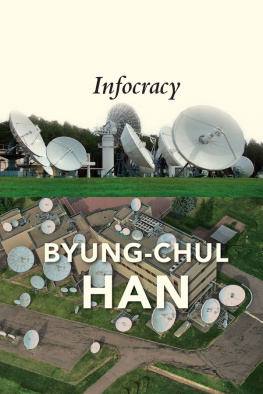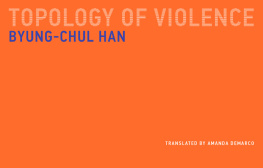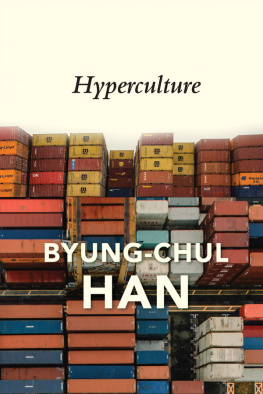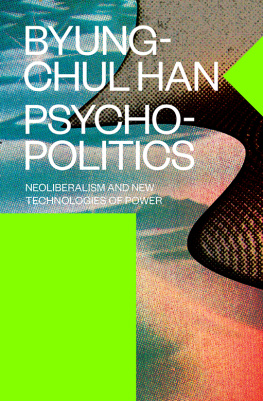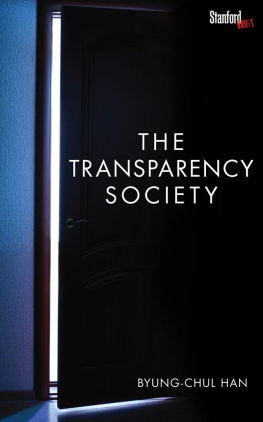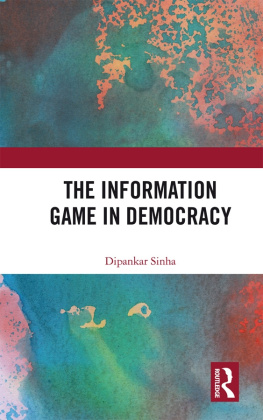CONTENTS
Guide
Pages
Infocracy
Digitalization and the Crisis of Democracy
Byung-Chul Han
Translated by Daniel Steuer
polity
Originally published in German as Infokratie. Digitalisierung und die Krise der Demokratie MSB Matthes & Seitz Berlin Verlagsgesellschaft mbH, Berlin 2021. All rights reserved.
This English edition Polity Press, 2022.
Polity Press
65 Bridge Street
Cambridge CB2 1UR, UK
Polity Press
101 Station Landing
Suite 300
Medford, MA 02155, USA
All rights reserved. Except for the quotation of short passages for the purpose of criticism and review, no part of this publication may be reproduced, stored in a retrieval system or transmitted, in any form or by any means, electronic, mechanical, photocopying, recording or otherwise, without the prior permission of the publisher.
ISBN-13: 978-1-5095-5299-3
A catalogue record for this book is available from the British Library.
Library of Congress Control Number: 2022932415
The publisher has used its best endeavours to ensure that the URLs for external websites referred to in this book are correct and active at the time of going to press. However, the publisher has no responsibility for the websites and can make no guarantee that a site will remain live or that the content is or will remain appropriate.
Every effort has been made to trace all copyright holders, but if any have been overlooked the publisher will be pleased to include any necessary credits in any subsequent reprint or edition.
For further information on Polity, visit our website:
politybooks.com
The Information Regime
With the term information regime I refer to a form of domination in which information and its processing by algorithms and artificial intelligence have a decisive influence on social, economic and political processes. Under such a regime, what is exploited is information and data rather than bodies and energies, as is the case under disciplinary regimes. Power depends not on the possession of the means of production but on access to information that is used for psychopolitical surveillance and the control and prediction of behaviour. Information regimes are tied to information capitalism, which develops into surveillance capitalism and reduces human beings to consumer cattle that provide data.
The disciplinary regime is the form of domination characteristic of industrial capitalism. Its form is mechanical: each person is a cog in the disciplinary machinery of power. Disciplinary power enters the nerves and sinews, and out of a formless clay, an inapt Body, it produces a machine. Docile bodies are production machines. They are not bearers of data and information; they are bearers of energy. Under a disciplinary regime, human beings are drilled to become labouring cattle.
Information capitalism uses communication and interconnectedness, rendering obsolete the disciplinary techniques of spatial isolation, the strict regulation of work, and physical training. The ideal of the information regime is not docility, with the compliance and obedience it implies. The submissive subject of the information regime is neither docile nor obedient. The information regime assumes rather that its subject is free, authentic and creative. This subject produces itself and performs itself.
Foucaults disciplinary regime uses isolation as a means of domination: isolation is the primary condition of total submission. The panopticon, with its isolated cells, is the ideal symbol of the disciplinary regime. Isolation, however, cannot be transferred on to the information regime, which exploits communication in particular. Under the information regime, surveillance takes place via data. The isolated inmates of the disciplinary panopticon do not produce data because they do not communicate.
The target of biopolitical disciplinary power is the body: For capitalist society, it was biopolitics, the biological, the somatic, the corporeal, that mattered more than anything else. The biopolitical regime inserts the body into a production and surveillance machinery that optimizes it by way of a disciplinary orthopaedics. The information regime, whose emergence Foucault appears to have missed, does not pursue a biopolitical agenda. It is not interested in the body. It seizes the psyche by way of a psychopolitics. The body is now mainly understood in terms of aesthetics and fitness. At least in Western information capitalism, the body has for the most part been liberated from the disciplinary power that drilled it to become a labouring machine. The body has instead been seized by the beauty industry.
Every form of rule pursues a specific politics of visibility. For a sovereign regime, ostentatious demonstrations of power are essential. The spectacle is its medium. The ruling power presents itself with theatrical glamour. Such glamour even legitimizes it. Ceremonies and symbols of power stabilize rule. Pageantry, symbols of violence, grim feasts and ceremonial punishments are all part of the theatre and spectacle staged by the ruling power. Physical torture is publicly exhibited to achieve the greatest effect. The hangman and the condemned are actors, and the public space is a stage. The power of sovereignty works through theatrical visibility. It is a power that exhibits and makes itself known, that boasts and shines. For it to flourish, those subjected to this power have mostly to remain invisible.
The pre-modern sovereign regime is a society of the spectacle, but the modern disciplinary regime is a society of surveillance. The glamorous celebration of sovereignty and spectacular demonstrations of power give way to unspectacular bureaucratic surveillance. People are placed neither in the amphitheatre, nor on the stage, but in the panoptic machine.
The efficiency of the disciplinary panopticon consists in the fact that its inmates feel constantly observed. They internalize their surveillance. The creation of a state of conscious and permanent visibility is essential to disciplinary power. In George Orwells surveillance state, it is Big Brother who ensures permanent visibility: Big Brother is watching you. Under the disciplinary regime, spatial measures such as confinement and isolation guarantee the visibility of the subjugated. The subjugated are assigned specific locations in space that they are not permitted to leave. Their mobility is severely limited so that they cannot avoid the panopticon.
In the information society, the disciplinary regimes structures of confinement dissolve into open networks. The information regime adheres to the following topological principles: discontinuities are reduced in favour of continuities; confinement gives way to openings; isolated cells are replaced with communicative networks. Visibility is now produced in a totally different way: not through isolation but through interconnection. Digital information technology turns communication into surveillance. The more data we generate and the more intensely we communicate, the more efficient surveillance becomes. The mobile phone is a surveillance and subjugation apparatus that exploits freedom and communication. Under the information regime, people do not feel that they are under surveillance. They feel free. Paradoxically, it is the feeling of freedom that secures the rule of the regime. This is the fundamental difference between the information and the disciplinary regimes. When freedom and surveillance coincide, domination becomes complete.
The information regime has no need for disciplinary pressure. It does not impose panoptic visibility on people. People expose themselves out of an inner need without any external compulsion. People

